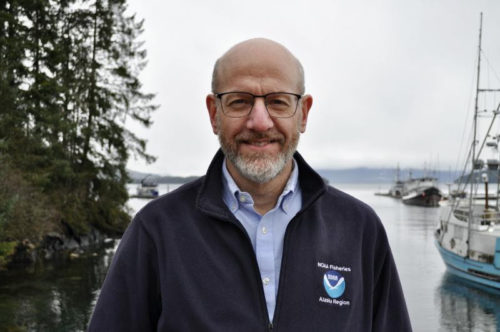Juneau’s Jon Kurland Named NOAA Fisheries Alaska’s New Regional Administrator

The following is courtesy of National Oceanic and Atmospheric Administration’s Alaska Region:
Today, NOAA Fisheries announced that Mr. Jon Kurland is the new Regional Administrator for NOAA Fisheries’ Alaska Region. He will assume his new duties on March 27, 2022. Mr. Kurland has been with the agency since 1990, serving in two Regional Offices and headquarters, including three senior leadership roles in the Alaska Region: Assistant Regional Administrator for Habitat Conservation, Acting Deputy Regional Administrator, and, since 2012, Assistant Regional Administrator for Protected Resources. He succeeds retiring Regional Administrator Dr. Jim Balsiger who had been in the position for 21 years.
“I am extremely pleased to announce this appointment,” said NOAA Fisheries’ Assistant Administrator Janet Coit. “Alaska’s waters support some of the most productive and valuable commercial fisheries in the world, and are also home to nationally and globally significant marine mammal populations and habitats. For Alaskans, the effects of climate change on these resources is real. I am confident that Jon will bring a unique awareness of these changes to this new role. I am excited for him to dive in.”
As Regional Administrator, Mr. Kurland will head the agency’s regulatory and management programs for fisheries, marine mammals, and habitat conservation, including responsibility for managing approximately 105 employees and 20 contractors and other affiliates. The Alaska Regional Office is located in the capital city of Juneau, with field staff in offices in Anchorage, Kodiak, and Dutch Harbor, Alaska. The office works closely with its counterpart, the Alaska Fisheries Science Center, in the science-based stewardship of living marine resources and their habitats in the waters of the North Pacific and Arctic Oceans off Alaska.
In his new role, Mr. Kurland will oversee sustainable fisheries that produce more than half the fish caught in U.S. waters, contributing more than $7 billion to the national economy and supporting our nation’s food security. He will also oversee programs to conserve marine mammals and habitats that contribute to healthy ecosystems and support a robust tourism industry and well as vital subsistence uses by Alaska Natives. The office’s responsibility includes nearly 1.5 million square miles (70 percent of the total U.S. continental shelf) of the North Pacific Ocean, including the Arctic Oceans (Chukchi and Beaufort seas), Gulf of Alaska, and the eastern Bering Sea.
“Jon’s experience and leadership in all facets of our mission—from protected resources management, to habitat conservation, to sustainable fisheries—has prepared him well for this new role,” said NOAA Fisheries Deputy Assistant Administrator Sam Rauch. “He comes into this job with a focus on people, including people he works with at NOAA, the people and organizations we partner with, and our co-managers, Alaska Natives, who have an important role to play in the North Pacific.”
The regional office works closely with the North Pacific Fishery Management Council, the State of Alaska, the fishing industry, and other stakeholders to manage federal commercial and recreational fisheries, marine mammals, habitat, and much more. As administrator, he will also oversee critical aspects of international fisheries conservation and management in the region and co-management of subsistence use of marine mammals with Alaska Native partners, including:
- International Whaling Commission
- North Pacific Anadromous Fish Commission
- International Pacific Halibut Commission
- Pacific Salmon Treaty Commission
“I am honored and excited to serve as Regional Administrator,” Kurland said. “Alaska’s marine resources are vitally important to the American people and the economy as well as for Alaska Native traditions and subsistence use. I look forward to supporting NOAA Fisheries’ staff as we strive to manage these resources sustainably and to be more adaptive in response to climate change.”
In his most recent role as the Assistant Regional Administrator for Protected Resources with the Alaska Region, Mr. Kurland oversaw the development and implementation of conservation and recovery programs under the Marine Mammal Protection Act and Endangered Species Act. In that role he managed numerous high-profile and controversial analyses and rulemakings related to marine mammal conservation.
Previously, Mr. Kurland served for two years as acting Deputy Regional Administrator, and eight years as Assistant Regional Administrator for Habitat Conservation. Before moving to Alaska in 2002 Mr. Kurland was the national Essential Fish Habitat Coordinator for the agency in the headquarters office in Silver Spring, Maryland.
Mr. Kurland began his career in the Habitat Conservation program in NOAA Fisheries’ Northeast Region (now the Greater Atlantic Regional Fisheries Office) in Gloucester, Massachusetts, where he worked for nine years. He completed NOAA’s Leadership Competencies Development Program in 2002, during which he served in rotational assignments as the Deputy Director of the agency’s Office of Sustainable Fisheries and as lead analyst for portions of an Endangered Species Act biological opinion concerning the effects of the Alaska groundfish fisheries on endangered Steller sea lions.
Mr. Kurland earned a Masters of Art in Marine Affairs from the University of Rhode Island and a Bachelors of Art with honors in Government from Hamilton College. He is an alumnus of the Williams College/Mystic Seaport Maritime Studies Program.
He has received numerous honors throughout his career, including the Department of Commerce Gold Medal, Silver Medal, and Bronze Medal (four times), NOAA Administrator’s Award, NOAA General Counsel’s Award (twice), and NOAA Fisheries’ Employee of the Year (twice).
Mr. Kurland lives in Juneau, Alaska. In his free time he enjoys spending time with his family, alpine hiking, downhill and cross-country skiing, walks on the beach, and reading.



